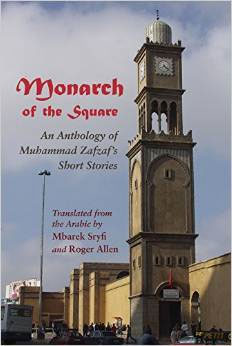Monarch of the Square: An Anthology of Muhammad Zafzaf’s Short Stories by Muhammad Zafzaf
Mbarek Sryfi & Roger Allen, tr. Syracuse, New York. Syracuse University Press. 2014. ISBN 9780815633693
 Muhammad Zafzaf (1945–2001) was one of the most noted writers of Morocco. He authored several novels and many short stories, exerted a remarkable influence on his generation of fiction writers in the Maghreb, and achieved a wide readership in the Arab world. This anthology is the first of his works to be translated into English and contains forty-four short stories from his nine collections published between 1970 and 1996.
Muhammad Zafzaf (1945–2001) was one of the most noted writers of Morocco. He authored several novels and many short stories, exerted a remarkable influence on his generation of fiction writers in the Maghreb, and achieved a wide readership in the Arab world. This anthology is the first of his works to be translated into English and contains forty-four short stories from his nine collections published between 1970 and 1996.
The stories are well chosen to represent Zafzaf’s masterful art of narrative writing, and the translation is a faithful rendering that successfully retains his adroit conveying of local color and of Moroccan concerns in villages and cities. The stories cover many aspects of people’s lives, each portraying a simple example of struggle for survival in a difficult modern world that is constantly changing, yet each is unique in its contribution to the message of its inventive author.
“The Monarch of the Square,” the title story of this anthology, is the story of a penniless, hungry boy who has found no food in the square’s garbage cans and dreams of becoming rich one day and owning a luxury car like those he sees passing him by. He approaches a group of Moroccans and policemen leaving a bar with a drunken American soldier who has not paid for his drinks and who, on seeing the boy, claims through a Moroccan interpreter that the boy is the one who has stolen his wallet. The boy is seized by the police, who say they will release him later because they know he is innocent but for “these disgusting American soldiers.” This is a simple story of poverty amid affluence and of injustice and police dereliction of duty—in only three pages.
The other stories in this anthology are similar in their portrayal of life by showing a slice of existence in a discerning glimpse, often with a calculated measure of sympathy but sometimes with irony. Doing so, Zafzaf offers visions of Moroccan culture and its traditions in an easygoing style that is well-nigh incomparable.
Issa J. Boullata
McGill University






























